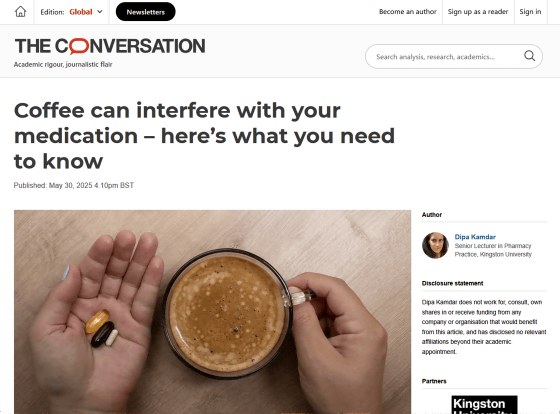Coffee may affect the effectiveness of medications. What medications should you be careful of?

Coffee is a drink loved by people all over the world, and some people feel that they can't start their day without drinking coffee. However,
Coffee can interfere with your medication – here's what you need to know
https://theconversation.com/coffee-can-interfere-with-your-medication-heres-what-you-need-to-know-256919

◆1: Cold and flu medicines
Caffeine is a psychostimulant that increases the activity of the central nervous system. Pseudoephedrine, which is found in cold and flu medicines as a nasal allergy medication, is also a psychostimulant, and when combined with caffeine, its effects are intensified, potentially causing problems such as irritability, restlessness, headaches, increased heart rate, and insomnia.
Many cold and flu medicines already contain caffeine, which increases these risks. Additionally, taking caffeine and pseudoephedrine together may increase blood sugar and body temperature, which is especially problematic for people with diabetes.
Other stimulant concerns include caffeine being used in combination with amphetamines , which are used to treat ADHD, or asthma medications such as theophylline , which has a similar chemical structure to caffeine, which could increase the risk of side effects such as increased heart rate and sleep problems, Kamdar said.

◆2: Thyroid hormone
The caffeine in coffee increases intestinal peristalsis , pushing food and waste out of the digestive tract more quickly, shortening the time it takes for the drug to be absorbed. It's also possible that the caffeine and drug chemicals in the stomach can bind together, preventing the drug from being absorbed into the body. These interactions are more common with tablet-type levothyroxine and less likely to occur with liquid versions.
If caffeine inhibits the absorption of levothyroxine, the symptoms of hypothyroidism such as fatigue, weight gain, and constipation may recur even if you are taking the drug correctly. In addition, medications containing bisphosphonates , which are used to treat osteoporosis, should be used with caution when taken with coffee, just like levothyroxine.

◆3: Antidepressants and antipsychotics
In addition, tricyclic antidepressants (TCAs) such as amitriptyline and imipramine , which have been used for a longer time than SSRIs, are broken down by a liver enzyme called CYP1A2 , which also metabolizes caffeine. Competition between TCAs and caffeine for the decomposition enzyme can cause the drug to be broken down more slowly, increasing side effects, or the excretion of caffeine can be delayed, leading to longer-than-usual irritability and excitement.
Another antipsychotic, clozapine , used to treat schizophrenia, is also broken down by CYP1A2. One study showed that drinking two to three cups of coffee can increase blood levels of clozapine by up to 97%, increasing the risk of drowsiness, confusion, and more serious complications.

◆4: Painkillers
Some over-the-counter painkillers, like aspirin and acetaminophen , contain caffeine to speed up stomach emptying, increase stomach acid levels, and speed up drug absorption. While this has the benefit of helping the painkiller work faster, Kamdar warns that when combined with other sources of caffeine, like coffee, it can increase the risk of stomach irritation and bleeding.
5. Heart disease medication
Caffeine has the effect of temporarily increasing blood pressure and heart rate, which generally lasts for about 3 to 4 hours after ingestion. If you are taking blood pressure lowering drugs or drugs to suppress arrhythmia due to heart disease, the caffeine in coffee may counteract the effects of the drugs.
'This doesn't mean that people with heart disease should avoid coffee completely, but they should monitor how coffee affects their symptoms and consider limiting their intake or switching to decaffeinated coffee if necessary,' Kamdar advised.

Kamdar offers the following advice on how to make sure coffee doesn't interfere with the effects of your medication:
Take levothyroxine or bisphosphonates on an empty stomach with water, 30 to 60 minutes before drinking coffee or eating breakfast.
- Caffeine may intensify side effects, so be careful when using it with cold or flu medications, asthma medications, or ADHD medications.
If you are taking antidepressants, antipsychotics, or blood pressure medications, talk to your doctor about your caffeine habits.
If you experience side effects like restlessness, insomnia or palpitations, consider reducing your intake or choosing a decaffeinated option.
'Everyone metabolizes caffeine differently. Some people can tolerate three cups, while others may experience side effects after just one cup. Pay attention to how your body responds and consult a pharmacist or doctor if something seems a bit off. If you're not sure whether your medications and coffee interact, ask your pharmacist or doctor. A little advice could help you avoid weeks of side effects or a weakened treatment, and you'll be able to drink coffee with peace of mind,' Kamdar said.

Related Posts:
in Science, Food, Free Member, Posted by log1h_ik







